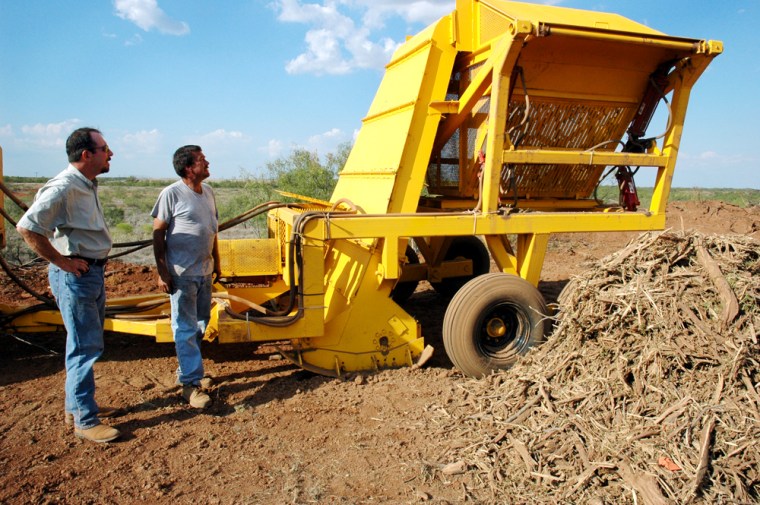Large clouds of dust filled the air as the bulky machine lumbered down the field, gobbling up every mesquite tree in its path.
Farmers and ranchers smiled as they watched their pesky nemesis being devoured, but they grinned as well about the possibility of turning that thorny tree into future fuel.
North Texas mesquite could soon get your motor running.
The Texas A&M Agricultural Research and Extension Center in Lockett is working on a project dubbed the "Mesquite Alternative Fuel Project," which will study the feasibility of harvesting mesquite and turning it into cellulosic ethanol.
"The whole program is developed to try to use the mesquite that nobody wants," said Jim Ansley, professor and the rangeland ecologist who is overseeing the project.
Leaders in the renewable energy industry are casting covetous eyes on all sorts of plant matter to use in making this type of fuel. Ethanol made from corn is already used in regular gasoline like breadcrumbs in meatloaf. About 10 percent can be blended into regular gasoline, making it go farther.
Cellulosic ethanol is ethanol made out of any other kinds of plant matter than corn: rice hulls, willow, wheat straw, cotton gin trash, construction waste and more, experts said. All plant matter contains cellulose.
"You can go nuts. You could put 200 things on the list," said Arnold R. Klann, chief executive officer of California-based BlueFire Ethanol Inc.
'Ultimate sustainable resource'
But one of the top things on the list in Texas is mesquite, often a nuisance plant. And North Texas has plenty of it, Ansley said.
The plant is perfect for harvesting because of its high regrowth rate. Mesquite also tends to grow on flatter sites, which are easier to harvest, he said.
"The program is the ultimate sustainable resource," Ansley said. "It could potentially provide some economic benefit to rural areas."
The Wilbarger County extension site is currently in the "inception phase" of building and experimenting with the machinery needed to cut and collect mesquite for fuel production.
Ansley's staff cranked up both cutting machine and harvester prototypes to showcase the possible technology to attendees at a recent public event.
Rancher Macon Boddy of Henrietta said the mesquite project looks promising. "We're all looking for alternative uses for our land," he said. "If you made your brush work pay its own way (by harvesting the mesquite for fuel), that would be an incredible benefit."
52 million acres to work with
Texas has 52 million acres of mesquite trees, said Montey Sneed, a marketing executive for Pearson Bioenergy Inc. of Aberdeen, Miss., and founder of Texas Ethanol Co. Sneed, of Vernon, sees mesquite is a renewable "feedstock" to make ethanol.
Cutting a mesquite tree down agitates it, and it grows back fiercely. It's renewable at least every 10 years, and it's one of the hardest woods out there — a plus for a biofuel feedstock.
Pearson's process can turn a ton of "waste biomass" into 214 gallons of ethanol, Sneed said. The company has a proprietary method that turns biomass into gas in the first stage. In the second stage, the gas is converted to ethanol.
Several methods of converting plant matter into ethanol are out there, said Carol Werner, executive director of the Washington, D.C.-based Environmental and Energy Study Institute.
Technologies can involve introducing enzymes, fermenting the plant matter or heating it up to high temperatures to break it down, Werner said.
The biofuel, itself, is something like your great-granddaddy's moonshine. "It's like 200 proof in terms of that, which is why, in order for ethanol to be sold, it has to actually be contaminated," Werner said.
No one has built cellulosic ethanol refineries in the United States yet, although the technology is in use in places like Japan.
"But it would not surprise me if we saw this beginning within five years from now," Ansley said.
That's going to depend a lot on fuel prices. "If gasoline dips down and stays low, we as a society tend to forget our needs for alternative fuels," he said. "We sort of become lazy again, so any funding to help this out kind of evaporates."
Then when the next crisis crops up, everyone's interested again, Ansley said.
